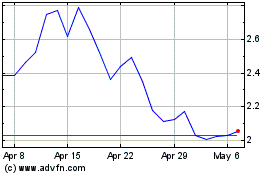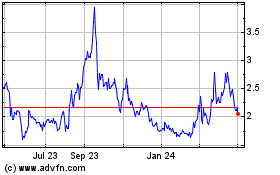Indaptus Therapeutics, Inc. (Nasdaq: INDP), a clinical biopharma
company that utilizes a proprietary killed, non-pathogenic
bacteria-based platform to generate a stabilized package of immune
agonists to activate both innate (immediate) and adaptive (learned)
cellular immune pathways, announces interim data from the first
cohort of four patients in the Phase 1 INDP-D101 trial of its lead
compound, Decoy20. A broad expression of cytokines and chemokines
associated with innate and adaptive anti-tumor immune responses was
observed, while adverse events were generally tolerable and
resolved within 30 minutes to three days. Decoy20 is designed to
“re-set” the immune system’s response to cancer. The poster was
presented on November 4, 2023, at the Society for Immunotherapy of
Cancer in San Diego.
“We are impressed that we saw short-term induction of more than
50 cytokines, chemokines and biomarkers and believe this is
unprecedented with a single agent. These early data support our
long-standing hypothesis that the Decoy platform may induce robust
immune responses across multiple types of immune cells that we
believe are important for the eradication of solid tumors,”
commented Indaptus CEO Jeffrey Meckler.
“The relatively brief duration of exposure to Decoy20 supports
our hypothesis of utilizing a “pulse-prime” approach, providing a
short period of activation to avoid unwanted toxicities that may
occur from prolonged immune activation,” commented Michael Newman,
Ph.D., Indaptus Founder and Chief Scientific Officer.
As reported in the poster, trial subjects experienced transient
induction of over 50 different biomarkers associated with immune
responses, and generally anticipated transient adverse events.After
the end of infusion, Decoy20 was cleared from the blood within 30
to 120 minutes. This rapid clearance and associated transient
cytokine/chemokine induction are desired to avoid prolonged
toxicity, often associated with longer term cytokine exposure. In
contrast, therapeutics that are designed to be continuously present
over weeks, months, or even years, such as CAR-T, can induce this
type of toxicity. Peak cytokine and chemokine induction occurred
within ~4 to 24 hours and most returned to baseline by 24-48 hours.
Lymphocyte cell populations were transiently reduced in the blood
and then rebounded, suggesting that these critical immune cells
were redistributing from the circulation to lymph nodes, immune
organs or sites of tumor. This supports the hypothesis of an
“immune resetting” proposed mechanism of action.
In addition, each of the subjects was observed to have stable
disease four weeks after a single dose, with three of them having
started the trial with progressive disease.
“We look forward to continuing the trial with the current cohort
having a lower dose, given the broad potential immune activation we
have observed,” added Roger Waltzman, M.D., Indaptus’ Chief Medical
Officer. “We anticipate that in the next stage of the trial we will
assess the effect of weekly dosing (as opposed to the single dose
in these first two cohorts), while analyzing a host of biomarkers,
immune and tumor cells in peripheral blood, and immune cell
populations in the tumor microenvironment, coupled with standard
radiographic measurements.”
The poster was titled, “Preliminary results of an in progress,
first-in-human Phase 1 study of Decoy20, an intravenous, killed,
multiple immune receptor agonist bacterial product in patients with
advanced solid tumors.” First cohort patients received a single
dose of 7x107 killed Decoy20 bacteria via a one-hour IV
infusion.
About Indaptus TherapeuticsIndaptus
Therapeutics has evolved from more than a century of immunotherapy
advances. The Company’s novel approach is based on the hypothesis
that efficient activation of both innate and adaptive immune cells
and pathways and associated anti-tumor and anti-viral immune
responses will require a multi-targeted package of immune
system-activating signals that can be administered safely
intravenously (i.v.). Indaptus’ patented technology is composed of
single strains of attenuated and killed, non-pathogenic,
Gram-negative bacteria producing a multiple Toll-like receptor
(TLR), Nucleotide oligomerization domain (NOD)-like receptor (NLR)
and Stimulator of interferon genes (STING) agonist Decoy platform.
The product candidates are designed to have reduced i.v. toxicity,
but largely uncompromised ability to prime or activate many of the
cells and pathways of innate and adaptive immunity. Decoy product
candidates represent an antigen-agnostic technology that have
produced single-agent activity against metastatic pancreatic and
orthotopic colorectal carcinomas, single agent eradication of
established antigen-expressing breast carcinoma, as well as
combination-mediated eradication of established hepatocellular
carcinomas and non-Hodgkin’s lymphomas in standard pre-clinical
models, including syngeneic mouse tumors and human tumor
xenografts. In pre-clinical studies tumor eradication was observed
with Decoy product candidates in combination with anti-PD-1
checkpoint therapy, low-dose chemotherapy, a non-steroidal
anti-inflammatory drug, or an approved, targeted antibody.
Combination-based tumor eradication in pre-clinical models produced
innate and adaptive immunological memory, involved activation of
both innate and adaptive immune cells, and was associated with
induction of innate and adaptive immune pathways in tumors after
only one i.v. dose of Decoy product, with associated “cold” to
“hot” tumor inflammation signature transition. IND-enabling,
nonclinical toxicology studies demonstrated i.v. administration
without sustained induction of hallmark biomarkers of cytokine
release syndromes, possibly due to passive targeting to liver,
spleen, and tumor, followed by rapid elimination of the product.
Indaptus’ Decoy product candidates have also produced significant
single agent activity against chronic hepatitis B virus (HBV) and
chronic human immunodeficiency virus (HIV) infections in
pre-clinical models.
Forward-Looking StatementsThis
press release contains forward-looking statements within the
meaning of the Private Securities Litigation Reform Act. These
include statements regarding management’s expectations, beliefs and
intentions regarding, among other things: our expectations and
plans regarding our Phase 1 clinical trial of Decoy20, including
the timing and design thereof, the timing of the enrollment of the
second cohort of patients in the Phase 1 trial, and our
expectations regarding the recommended Phase 2 doses for subsequent
multi-dosing and combination studies and related timing; the
anticipated effects of our product candidates, including Decoy20;
and upcoming events and presentations. Forward-looking statements
can be identified by the use of forward-looking words such as
“believe”, “expect”, “intend”, “plan”, “may”, “should”, “could”,
“might”, “seek”, “target”, “will”, “project”, “forecast”,
“continue” or “anticipate” or their negatives or variations of
these words or other comparable words or by the fact that these
statements do not relate strictly to historical matters. Because
forward-looking statements relate to matters that have not yet
occurred, these statements are inherently subject to risks and
uncertainties that could cause our actual results to differ
materially from any future results expressed or implied by the
forward-looking statements. Many factors could cause actual
activities or results to differ materially from the activities and
results anticipated in forward-looking statements, including, but
not limited to the following: our limited operating history;
conditions and events that raise substantial doubt regarding our
ability to continue as going concern; the need for, and our ability
to raise, additional capital given our lack of current cash flow;
our clinical and preclinical development, which involves a lengthy
and expensive process with an uncertain outcome; our incurrence of
significant research and development expenses and other operating
expenses, which may make it difficult for us to attain
profitability; our pursuit of a limited number of research
programs, product candidates and specific indications and failure
to capitalize on product candidates or indications that may be more
profitable or have a greater likelihood of success; our ability to
obtain and maintain regulatory approval of any product candidate;
the market acceptance of our product candidates; our reliance on
third parties to conduct our preclinical studies and clinical
trials and perform other tasks; our reliance on third parties for
the manufacture of our product candidates during clinical
development; our ability to successfully commercialize Decoy20 or
any future product candidates; our ability to obtain or maintain
coverage and adequate reimbursement for our products; the impact of
legislation and healthcare reform measures on our ability to obtain
marketing approval for and commercialize Decoy20 and any future
product candidates; product candidates of our competitors that may
be approved faster, marketed more effectively, and better tolerated
than our product candidates; our ability to adequately protect our
proprietary or licensed technology in the marketplace; the impact
of, and costs of complying with healthcare laws and regulations,
and our failure to comply with such laws and regulations;
information technology system failures, cyberattacks or
deficiencies in our cybersecurity; and unfavorable global economic
conditions. These and other important factors discussed under the
caption “Risk Factors” included in our Quarterly Report on Form
10-Q for the quarter ended June 30, 2023 filed with the SEC on
August 14, 2023, our most recent Annual Report on Form 10-K filed
with the SEC on March 17, 2023, and our other filings with the SEC,
could cause actual results to differ materially from those
indicated by the forward-looking statements made in this press
release. All forward-looking statements speak only as of the date
of this press release and are expressly qualified in their entirety
by the cautionary statements included in this press release. We
undertake no obligation to update or revise forward-looking
statements to reflect events or circumstances that arise after the
date made or to reflect the occurrence of unanticipated events,
except as required by applicable law.
Contact: investors@indaptusrx.com
Investor Relations Contact:CORE IRLouie
Tomalouie@coreir.com
Media Contact:CORE
IRJules Abrahamjulesa@coreir.com917-885-7378
Indaptus Therapeutics (NASDAQ:INDP)
Historical Stock Chart
From Mar 2024 to Apr 2024

Indaptus Therapeutics (NASDAQ:INDP)
Historical Stock Chart
From Apr 2023 to Apr 2024
